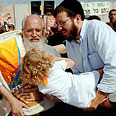
Disengagement
Photo: Amir Cohen
We are seeing a rare consensus: The slogan “land for peace” has disappeared. The Gaza disengagement, which created a new equation - “land for rockets” - left the “peace camp” with a minimalistic objective, bordering on the primitive: “Changing security realities” – a euphemistic expression of a notion that people used to disparage: We’ll hit them so hard that they won’t dare do it again.
Along the way, the mystical belief in negotiations and agreements was also abandoned. And here’s yet another consensus: We did not embark on an operation meant to destroy Hamas. The Left says it because it views terror groups as unbeatable. The Right says it because it realizes that a defeated Hamas will be necessarily replaced by Fatah, which would enable the establishment of a Palestinian state and prompt an existential national disaster.
It isn’t worth it to pay the price of seeing Tel Aviv bombed, Jerusalem divided, and a small-scale civil war in Judea and Samaria just in order to teach the Left, the hard way, that there is no difference between Fatah and Hamas, and that what happened in Gaza will happen in Judea and Samaria. Should the pulverized Hamas survive, we’ll be spared all of this, and our Palestinian enemies shall continue to fight each other.
There’s also consensus against taking over the Strip. The Left says it because the mere mention of “occupation” causes anxiety among its ranks, while the Right says it because it knows Israel would hand over Gaza to Fatah, and this is no reason to send our soldiers into battle.
Therefore, why did we embark on the ground incursion? To take over launching sites? And how long will we hold on to them? The truth is that the objective is to kill so many of them so that they “learn the lesson.” In the failed Vietnam War they referred to it as “body count.” However, the other side can also kill, and how many of our own victims compared to their victims will count as “victory?” The answer is that not even one Israeli soldier is worth it.
One does not conquer land in order to kill, but rather, for a substantive and defined purpose. For example, to take over the northern section of the Strip, or to hold on to areas that would enable us to monitor developments in Gaza refugee camps, or to take over the Philadelphi Route and the adjacent areas.
When the northern section of the Strip was home to the Israeli communities of Nissanit, Elei Sinai, and Dugit, and when Netzarim separated Gaza from the refugee camps, and when Gush Katif was the home front of the Philadelphi Route, there were no rockets being fired at Ashdod and there were not Hizbullah-style “nature reserves” in the Strip.
Retrospectively, it’s already clear: The settlements in Gaza safeguarded Beersheba and Gedera, and by defending them the IDF defended the entire south (using much fewer forces.)
Now look at Judea and Samaria. There has been no second front there, and the IDF operates there as if it is a man in his own home; fortunately for Tel Aviv, there was no disengagement here. Meanwhile, the conclusion regarding the return of the Jews to their communities in Gaza is also clear, yet it cannot be stated in official media outlets as it is politically incorrect. Yet nonetheless, the time for it shall come.















